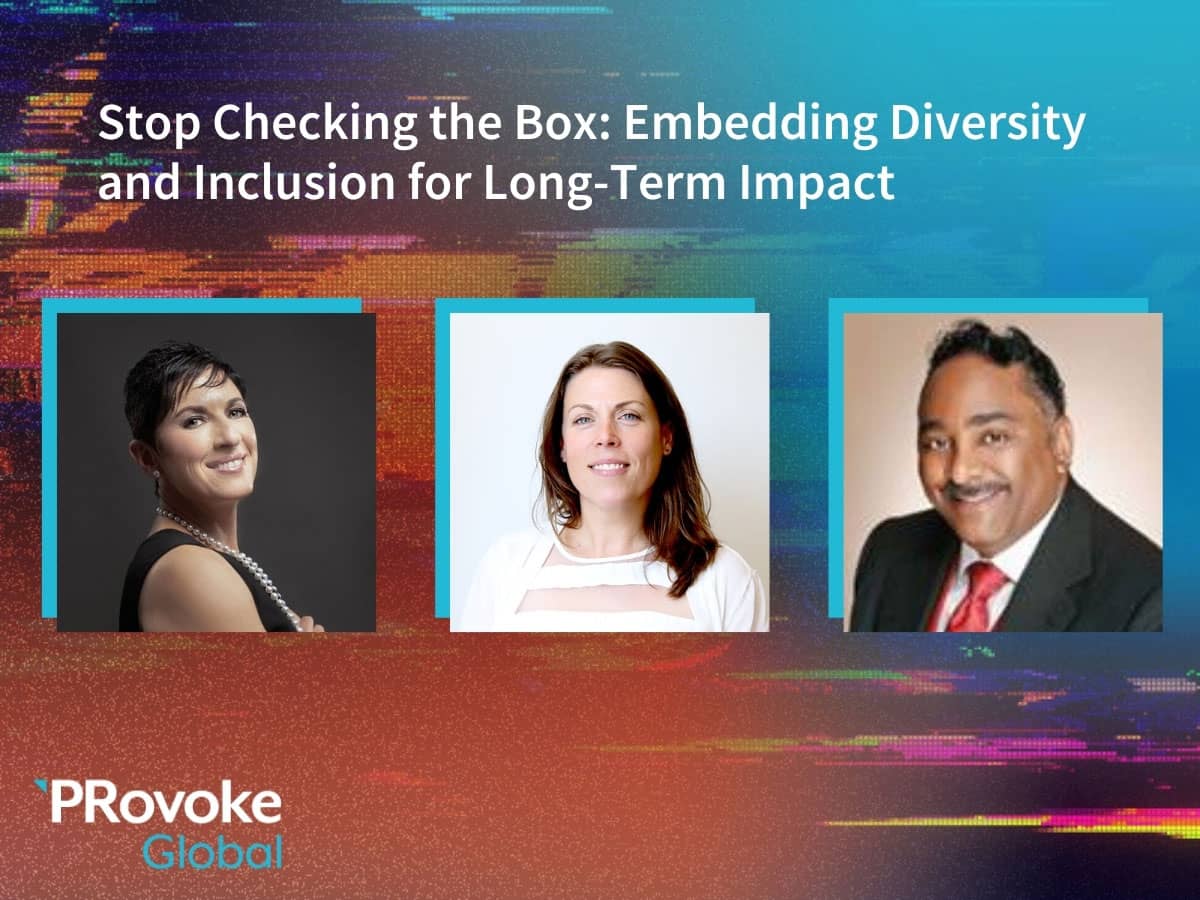Maja Pawinska Sims 21 Oct 2020 // 10:30PM GMT

Communications will continue to play a crucial role, internally and externally, in maintaining the momentum of the diversity, equity and inclusion conversation after the Black Lives Matter protests, according to speakers at PRovokeGlobal this week.
In a panel session led by Zeno Group’s CEO Barby Siegel with Hyatt’s global vice president of diversity, equity and inclusion Tyronne Stoudemire and global recruiter PageGroup’s UK D&I director Sheri Hughes, looked at how the public outcry this spring has transformed the DE&I conversation in c-suites – and how much progress still needs to be made.
Stoudemire said Hyatt’s communications team had taken a leading role in taking action on DE&I this year: “They’ve asked questions, sought to understand, and pushed us. Individuals have to care first, and then they need to put themselves in someone else’s shoes, so they’ve shifted the mindset from sympathy, to empathy – which equals action – by telling stories and being really real. They’ve taken it on with a vengeance, and they are not holding back.”
He said that as a result, Hyatt’s response had run through every aspect of the hotel giant’s business: “After the murder of George Floyd, we looked at where we can make a difference in society, who we hire and our goals to advance talent, and the entrepreneurs and suppliers we can support.
“We offered 1,000 pro bono hours from our corporate headquarters to help the Black and brown community, from criminal record expungements, to helping restaurant owners get digital platforms up and running, to inviting an African-American cupcake maker who had lost her lease in the pandemic into a hotel to make and sell her products.”
Stoudemire said the key to corporations moving forward beyond this moment was to be “curious enough to explore difference and courageous enough to have these conversations and hold ourselves accountable.” He said taking action on DE&I was “not about taking risks – it’s about good business sense and it’s the right thing to do.”
Sharing his own experience of being a Black man in America, Stoudemire said: “I feel fatigued and depressed, because I have a target on my back. My parents said you have to work twice as hard and you still won’t meet expectations. You will be questioned and doubted. Do we do that with white men? Women and people of color have to prove that they're competent; white men have to prove that they're not.”
At PageGroup, Hughes said the Black Lives Matter movement had accelerated a long process of embedding DE&I, in all its facets, into the company, and the impact of George Floyd’s death in the US had also been felt keenly by PageGroup’s Black employees in the UK.
“No-one came out of that knowledge unscathed, but our Black community was of course struck the hardest,” she said. “We had already set the foundations of our strategy and were well on way to implementing a lot of those things, but we had to stop and think: what do our Black community need right now?
“We took advice from our diversity partner and did a number of ‘Be Heard’ sessions, giving people a safe space to share and help those of us who aren’t Black to understand what it really felt like. There are a lot of similar patterns in the UK – parents are teaching their Black and biracial sons what to do when they are stopped by the police, not if. It’s supercharged all our activity around unity, and racial inclusion shot up many people’s agendas as a result.”
PageGroup’s approach to DE&I has also included bringing employees’ stories to life, said Hughes: “We highlight our people, and what it’s like to be a Black woman, to be a parent, to have a disability at Page. We’ve made it front and centre, and it can’t be ignored. Suddenly you get much more solidarity and allyship: no matter who you are, you can stand together and support each other, because we are one organisation, where everyone counts.”
As well as the positive notes, however, Siegel asked the question: “Are there people in your organisation that deny systemic racism, and how do you deal with that?”
Hughes’ frank response was that “Unfortunately, I don’t think everyone is on board yet, whether or not they are honest about it. Not everyone on the same train from the get-go, you have to gather people with you, and you can’t assume you are any way down the track. You need to keep asking: what’s the awareness, what needs to change, what baby steps need to be taken? Those who don’t get on board will be found out, and you’ll have to deal with that in a way that’s appropriate. There will always be some anomalies.”
And Hughes warned that any commitment to action would fail without buy-in at all levels of the business: “If we don’t look at our own culture, how can we help clients recruit diversely? But you have to have top down support and buy-in from everyone – it has to be a cultural shift and your organisation fundamentally has to change. It hasn’t been easy and it doesn’t happen overnight. This is a long-term change and you have to be committed. If you’re not prepared to honestly evolve, you won’t get anywhere.”
Stoudemire pointed out that corporate America had been “created for white men by white men” and businesses could only move towards equity and equality by looking at bias and eliminating barriers to success for Black and ethnic minority communities.
He agreed not everyone was on board with DE&I initiatives, but it was up to leadership to take a stand: “The silence scares me the most. If people are not sharing, I can’t help them. But the early adapters will bring people along.
“When George Floyd was murdered, our CEO made it clear in a global town hall that Black Lives Matter matters to us, and if it doesn’t matter to you, you are welcome to leave. If you line up, you have to be held accountable, because diversity without inclusion leads to confusion. If you don’t figure that out, you’re going to have a difficult time understanding what means to be a full diversity partner.”


































.jpg)

















